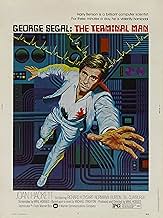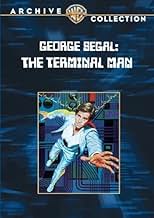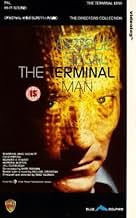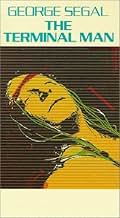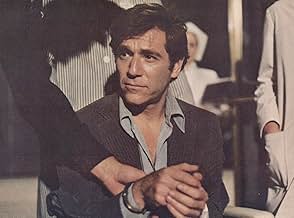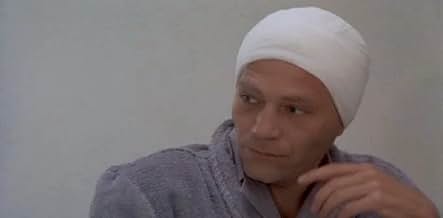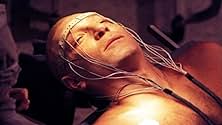Con la esperanza de curar sus ataques de desmayo, que le vuelven temporalmente extremadamente violento, un informático acepta someterse a una operación experimental de implante de un chip in... Leer todoCon la esperanza de curar sus ataques de desmayo, que le vuelven temporalmente extremadamente violento, un informático acepta someterse a una operación experimental de implante de un chip informático cerebral.Con la esperanza de curar sus ataques de desmayo, que le vuelven temporalmente extremadamente violento, un informático acepta someterse a una operación experimental de implante de un chip informático cerebral.
- Dirección
- Guionistas
- Elenco
- Dr. John Ellis
- (as Richard A. Dysart)
- Det. Capt. Anders
- (as Normann Burton)
- Dirección
- Guionistas
- Todo el elenco y el equipo
- Producción, taquilla y más en IMDbPro
Opiniones destacadas
Today's audiences however, with their short attention spans, will likely be permanently disappointed. To those who complain that this film is "slow" (and they are legion); I would say to either learn some patience, or simply avoid the film and go back to watching action/adventure.
While made in the early 1970's, it is highly relevant to today's world as well. Replace the "wires in the brain" with today's over-prescribed Ritalin, SSRI's, and other similar drugs, and you will see the point.
This is an excellent movie which deserves to be on DVD, with commentary by Crichton, Hodges and/or Segal. They are all still with us as of 4/2008 (Sadly Ms. Hackett is not). The sooner the better.
The likable George Segal stars as Harry Benson, a computer scientist who, since a car accident, has suffered from blackouts & seizures that made him dangerously violent. Now a team of surgeons is performing ground breaking surgery on him: attaching electrodes to 40 of his brain terminals that will hopefully counteract his violent impulses. However, as the viewer certainly suspects will happen, this doesn't work, and his brain ends up craving the shocks / stimuli that it receives, and Harry loses control once again.
I can certainly understand the problems that some people may have with this production, as it's really not the typical thriller at all. It's slow, and it's quiet; there's not even that much musical accompaniment on the soundtrack. It does exhibit a fairly cold, clinical approach, and the emphasis on the story's exposition will inevitably bore people more conditioned to non- stop action in what they watch. Even after Harry has made the expected escape from the hospital, he doesn't spend that much time running amok, and certainly does not kill very many people.
But this movie *is* noticeably intelligent and thoughtful and does offer rewards for patient viewers. It has one striking murder set piece that's rather artfully done; it takes place atop a water bed, and the sprays of water and the way the blood spreads definitely are what make the scene. And, like other movies of this kind, there is a certain wariness (voiced by Harry) on the part of mankind regarding the computer age and what it could mean for us all.
Another wonderful element to "The Terminal Man" is its incredible cast of both stars and rock solid character actors. Segal is effectively low key in the lead, and is nicely supported by Joan Hackett, Jill Clayburgh (in a small but welcome appearance), Richard Dysart, Donald Moffat, Matt Clark, Michael C. Gwynne, William Hansen, and Norman Burton. (It's particularly fun to see Dysart and Moffat sharing scenes eight years before they did John Carpenters' "The Thing" together.) And playing smaller roles are the likes of James B. Sikking, Steve Kanaly, Jack Colvin, Ian Wolfe, Lee de Broux, Victor Argo, and Nicholas Worth.
This is all reasonably engaging stuff, leading up to an ending that, while somewhat conventional, is staged in a very unique way. All in all, "The Terminal Man" is a good movie that does deserve to be discovered or rediscovered.
Seven out of 10.
I urge anyone with an IQ larger than their shoe size to ignore the negative comments and give this film a chance. Viewed with an open mind and a little patience, this movie becomes quite an exiting experience. It's one of the greatest sci-fi/horror films of all time, and has never gotten its due respect. It's the kind of film we could use more of, and the fact it's considered boring by today's audiences is very sad proof of the dumbing-down effect of Hollywood clap-trap. We're used to movies that ask you to set back while you're force-fed the story. The Terminal Man requires that you watch what's happening, listen to what's being said, and think about what's between the lines. If you can't do that, stick with Vin Diesel films.
"The Terminal Man" is everything but a bad film, although it's fairly easy to see why many people dislike it. The brief plot description promises an exciting concept of a man suffering from psychosis who agrees to participate in a scientific/medical experiment in which a tiny computer is implanted in his brain that will keep his violent impulses under control. Although seemingly successful at first, the man's brain somehow becomes addicted to the little shocks that the electrodes are sending out, resulting in the triggering of even more violent impulses. If you read it like this, "The Terminal Man" sounds like a tense, exciting and action-packed thriller, but instead it's actually a slow-brooding, atmospheric and integer drama. It all is a bit misleading perhaps The premise speaks of "A man suffering from a mental condition that often causes him to become homicidal", but we are only introduced to Harry Benson when he obediently awaits the operation and remains very calm and docile at all times. There are only a few photographs to indicate his violent nature. Then the operation itself is almost shown integrally, which raises the impression to last forever. Then, finally, the plot describes how Benson – and I quote – "escapes from the hospital and goes on a spree of violence and murder". Well, first of all, there's a long period of time between the operation and the escape in which barely anything happens. The so-called spree of violence and murder is somewhat exaggerated as well, since Benson only commits one murder (although admittedly a very savage one). However, to compensate for the lack of action, we do receive – next to the intelligent and tense script – a continuous series of extraordinary beautiful camera angles, compositions and set-pieces. Director Mike Hodges ("Get Carter", "Pulp") literally turns the film into a work of art, with stunning cinematography and exquisite use of classical music. I honestly wished for "The Terminal Man" to benefice from a faster pacing, a bit more background to Harry Benson's character, a bit less medical mambo-jumbo and a few more brutish murders.
His wife leaves him, and it looks like his outbursts will have him traveling through the criminal justice system which can do nothing for this situation or maybe he will wind up shot dead by some would be victim.
So some scientists think that Benson could be a beneficiary of an experimental procedure in which a small computer is implanted in his brain and his epilepsy is controlled by impulses the computer transmits. Post operation, things seem to be a success, but Dr. Janet Ross (Joan Hackett) discovers that Benson's brain is becoming addicted to the impulses, and in time - and she actually can calculate the time - he will have more frequent and severe violent outbursts.
But before she can do any kind of medical intervention, Benson leaves. Apparently he has prearranged an escape with some woman he barely knows, sporting a blond wig so you can't tell he just had surgery.
So the last half of the film is just Benson having those predicted seizures and becoming horrifically violent during each one. It doesn't have the pathos or irony of the Frankenstein monster's trek through the German countryside. Segal just begins to shake, his eyes roll up in his head, and he does violence to whomever and with whatever is at hand. That's it. That's essentially all that the last half is.
George Segal never really got the credit he deserved for some of the really good roles he had in the 70s. This is not one of those good roles, and I really don't see how he or anybody else but the writer could have saved a film that is really only half there. I'd give the pre-escape part of the film a 7 or 8. I'd give the last half a three. This is where I come up with my 5/10 rating.
¿Sabías que…?
- TriviaCrichton was fired from writing the screenplay due to the fact that his script did not follow the novel (which he had written) closely enough.
- ErroresAt the cemetery, the usual mechanism for lowering the coffin into the grave is missing. There aren't even any straps in place to lower it manually.
- Citas
Benson: [mumbles]
Dr. John Ellis: [operating on Benson] What was that?
Dr. Robert Morris: Patient.
Dr. John Ellis: You all right, Mr. Benson?
Benson: [groggily] Fine... fine...
Dr. John Ellis: Any pain?
Benson: No...
Dr. John Ellis: Good. Just relax now.
Benson: You too doctor...
- Versiones alternativasOn its release at 2003 Edinburgh Film Festival, there was a director's cut which Hodges had cut out the beginning with the doctor looking at photographs of Harry Benson.
- ConexionesFeatured in Cinemacabre TV Trailers (1993)
- Bandas sonorasGoldberg Variation No. 25
by Johann Sebastian Bach (as J.S. Bach)
Played by Glenn Gould
Courtesy Columbia Records
Selecciones populares
- How long is The Terminal Man?Con tecnología de Alexa
Detalles
- Fecha de lanzamiento
- País de origen
- Idioma
- También se conoce como
- The Terminal Man
- Locaciones de filmación
- Productora
- Ver más créditos de la compañía en IMDbPro
Taquilla
- Total en EE. UU. y Canadá
- USD 224,542
- Tiempo de ejecución1 hora 44 minutos
- Mezcla de sonido
- Relación de aspecto
- 1.85 : 1
Contribuir a esta página



